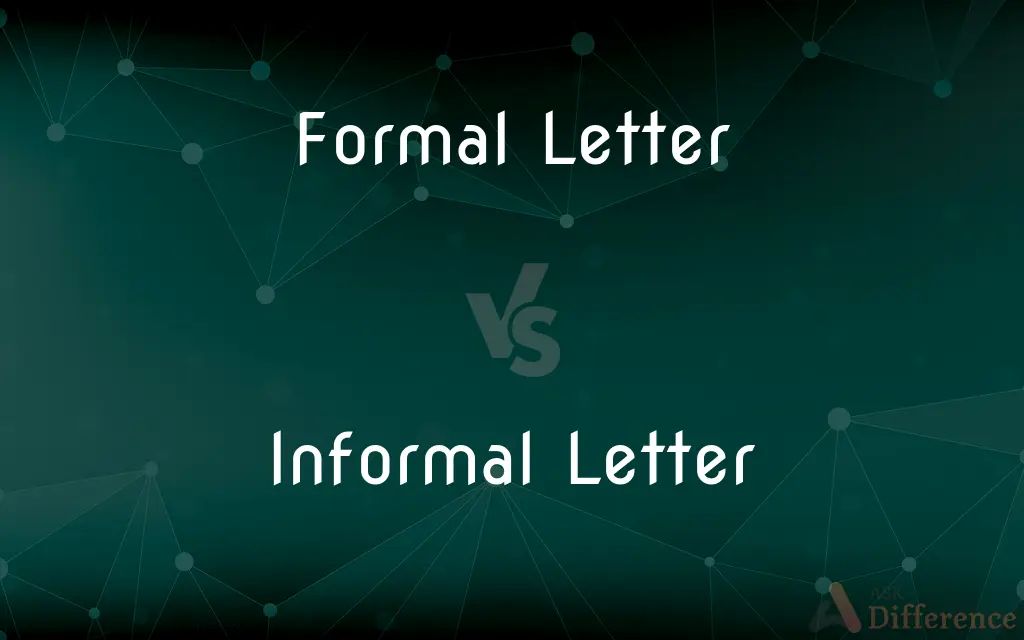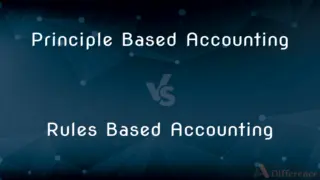Formal Letter vs. Informal Letter — What's the Difference?
By Tayyaba Rehman — Published on October 3, 2023
Formal Letters follow a structured format and professional tone, typically used for official purposes; Informal Letters have a casual tone and flexible structure, used for personal communications.

Difference Between Formal Letter and Informal Letter
Table of Contents
ADVERTISEMENT
Key Differences
Formal Letter and Informal Letter serve distinct purposes and are characterized by differing tones, structures, and levels of formality. A Formal Letter follows a strict structure, clear format, and professional, polite language, typically used for official, business, or professional correspondence. It's imperative in these letters to maintain a level of formality and respect for the recipient. Informal Letter, on the other hand, is characterized by a casual tone, flexible structure, and is used for personal or casual communication with friends or family.
Understanding the intended purpose of Formal Letter and Informal Letter is essential. A Formal Letter is designed to convey professional or official information, often adhering to specific guidelines or protocols, and is used to communicate with entities such as companies, institutions, or government bodies. Informal Letter, however, serves to express personal thoughts, feelings, and information to close acquaintances, usually without any stringent guidelines or protocols, emphasizing a personal and emotional connection.
Format and style significantly distinguish Formal Letter and Informal Letter. Formal Letter adheres to a specific format, including a clear salutation, body, and closing, with proper addressing and signing off, while focusing on clear, concise, and objective language. Informal Letter allows for a more relaxed structure, often including colloquial language, emotional expressions, and a friendly, conversational tone, reflecting the closeness between the sender and the recipient.
Correct use of Formal Letter and Informal Letter is crucial for effective communication. Using Formal Letter in official or professional contexts helps in maintaining professionalism and is essential for creating a positive impression. Conversely, using Informal Letter in personal communications fosters a sense of closeness and personal touch, strengthening the bond between the sender and the recipient.
Comparison Chart
Tone
Professional and polite.
Casual and friendly.
ADVERTISEMENT
Structure
Strict, with clear format and organized sections.
Flexible, with relaxed structure.
Purpose
Convey professional or official information.
Express personal thoughts, feelings, and information.
Language & Style
Clear, concise, and formal language, avoiding colloquial expressions.
Casual, conversational language, allowing colloquial expressions.
Recipient Relationship
Usually with entities or individuals in a professional or formal context.
Usually with close friends, family, or acquaintances.
Compare with Definitions
Formal Letter
Formal Letter is used for official or professional correspondence.
Always proofread a Formal Letter before sending it to avoid any mistakes.
Informal Letter
Informal Letter is typically written to close friends or family members.
The Informal Letter brought a sense of closeness and warmth, reminding me of shared memories.
Formal Letter
Formal Letter follows specific guidelines and maintains a level of formality.
The Formal Letter included a clear and concise presentation of the facts.
Informal Letter
Informal Letter is characterized by a relaxed, conversational style.
I enjoy writing Informal Letters as they allow for a more personal and engaging connection.
Formal Letter
Formal Letter adheres to strict structure and professional tone.
A well-crafted Formal Letter can create a positive impression on the recipient.
Informal Letter
Informal Letter has a casual tone and is used for personal communication.
I received an Informal Letter from a long-lost friend, filled with warm greetings and news.
Formal Letter
Formal Letter employs clear, polite, and objective language.
Using respectful language in a Formal Letter is crucial for maintaining professionalism.
Informal Letter
Informal Letter allows the use of colloquial language and expressions.
The Informal Letter was sprinkled with local slang and humorous remarks.
Formal Letter
Formal Letter is characterized by a clear salutation, body, and closing.
The structured layout of a Formal Letter aids in conveying the message effectively.
Informal Letter
Informal Letter follows a flexible structure, allowing personal expressions.
The Informal Letter had a friendly tone and shared personal anecdotes.
Common Curiosities
Can an Informal Letter have a flexible structure?
Yes, an Informal Letter typically has a relaxed and flexible structure.
Should Formal Letters adhere to specific formats?
Yes, Formal Letters should follow specific formats and guidelines.
Is a Formal Letter used for professional correspondence?
Yes, Formal Letters are typically used for professional or official correspondence.
What is the main purpose of a Formal Letter?
It is primarily used to convey professional, official, or business-related information.
Can Informal Letters be emotionally expressive?
Certainly, Informal Letters often include emotional expressions and personal thoughts.
Is clarity important in a Formal Letter?
Yes, clarity, conciseness, and correctness are imperative in Formal Letters.
Can Formal Letters create a positive impression?
Absolutely, well-crafted Formal Letters can convey professionalism and create a positive impression.
Is politeness important in a Formal Letter?
Absolutely, maintaining a polite and respectful tone is crucial in a Formal Letter.
Can colloquial language be used in an Informal Letter?
Yes, colloquial expressions and casual language are permissible in Informal Letters.
Can Informal Letters strengthen personal bonds?
Definitely, Informal Letters can foster a sense of closeness and strengthen personal bonds.
Who are the typical recipients of Informal Letters?
Informal Letters are usually written to close friends, family, or acquaintances.
Share Your Discovery

Previous Comparison
Usury vs. Interest
Next Comparison
Principle Based Accounting vs. Rules Based AccountingAuthor Spotlight
Written by
Tayyaba RehmanTayyaba Rehman is a distinguished writer, currently serving as a primary contributor to askdifference.com. As a researcher in semantics and etymology, Tayyaba's passion for the complexity of languages and their distinctions has found a perfect home on the platform. Tayyaba delves into the intricacies of language, distinguishing between commonly confused words and phrases, thereby providing clarity for readers worldwide.
















































